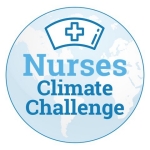Villanova Nursing Signs National Climate Challenge Commitment for Schools of Nursing

VILLANOVA, Pa. – Donna S. Havens, PhD, RN, FAAN, Connelly Endowed Dean and Professor of the Villanova University M. Louise Fitzpatrick College of Nursing, recently signed the Nurses Climate Challenge School of Nursing Commitment, thus agreeing to commit the College to educate students about climate and health. To date, the College is one of 16 schools of nursing in the nation to do so.
The Nurses Climate Challenge - a collaboration between Health Care Without Harm and the Alliance of Nurses for Healthy Environments (ANHE) - is “the first national campaign aiming to leverage the unique and trusted voice of nurses to motivate the health care sector to action,” according to its website. The goal is to educate 50,000 health professionals about the health impacts of climate change by 2022. Through the commitment, nursing students at all levels can participate in the movement.
“This public stance solidifies what we have been doing for some years now, weaving climate content into curricular and programmatic offerings, as well as research initiatives. We are proud to continue to be a leader in this area,” says Dean Havens.
Ruth McDermott-Levy, PhD, MPH, RN, FAAN, associate professor and director of the College’s Center for Global and Public Health, notes, “Climate change is our greatest public health threat and has implications in all areas of nursing practice including health policy. Nurses must be prepared to take leadership in climate mitigation and resilience to address this existential crisis.” She is well known in the area of climate and its health impacts for her education and science initiatives and is an integral member of ANHE, co-authoring its first textbook on climate and health, and an inaugural mentor for its fellows tackling environmental health threats, including climate disruption.
The health impacts of climate change are gaining attention, making it an important aspect of nursing care. By educating nursing students, they can better care for patients and communities in a world with a changing climate.
About Villanova University: Since 1842, Villanova University’s Augustinian Catholic intellectual tradition has been the cornerstone of an academic community in which students learn to think critically, act compassionately and succeed while serving others. There are more than 10,000 undergraduate, graduate and law students in the University's six colleges—the College of Liberal Arts and Sciences, the Villanova School of Business, the College of Engineering, the M. Louise Fitzpatrick College of Nursing, the College of Professional Studies and the Villanova University Charles Widger School of Law. Ranked among the nation’s top universities, Villanova supports its students’ intellectual growth and prepares them to become ethical leaders who create positive change everywhere life takes them. For more, visit www.villanova.edu.
